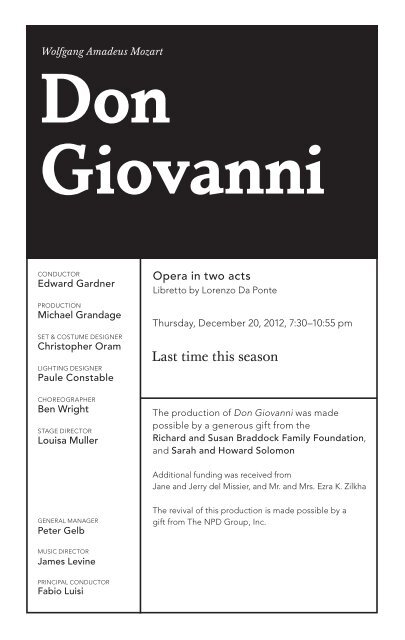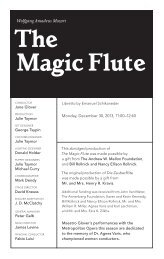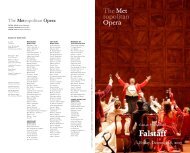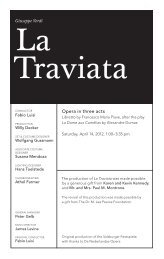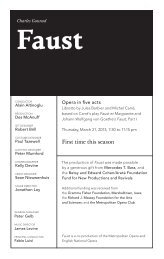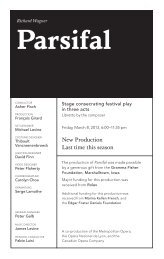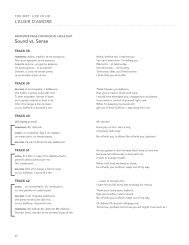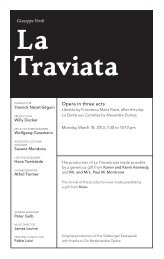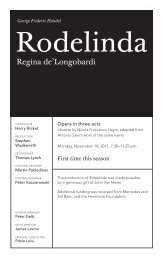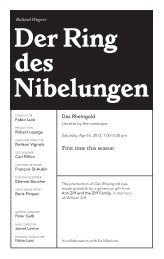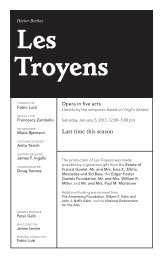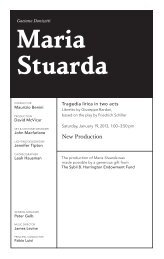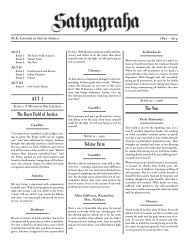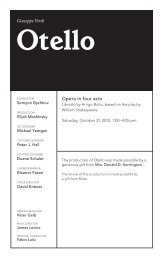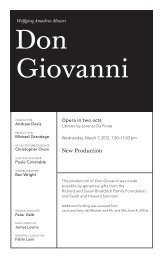Don Giovanni - Metropolitan Opera
Don Giovanni - Metropolitan Opera
Don Giovanni - Metropolitan Opera
Create successful ePaper yourself
Turn your PDF publications into a flip-book with our unique Google optimized e-Paper software.
Wolfgang Amadeus Mozart<br />
<strong>Don</strong><br />
<strong>Giovanni</strong><br />
CONDUCTOR<br />
Edward Gardner<br />
PRODUCTION<br />
Michael Grandage<br />
SET & COSTUME DESIGNER<br />
Christopher Oram<br />
LIGHTING DESIGNER<br />
Paule Constable<br />
CHOREOGRAPHER<br />
Ben Wright<br />
STAGE DIRECTOR<br />
Louisa Muller<br />
GENERAL MANAGER<br />
Peter Gelb<br />
MUSIC DIRECTOR<br />
James Levine<br />
PRINCIPAL CONDUCTOR<br />
Fabio Luisi<br />
<strong>Opera</strong> in two acts<br />
Libretto by Lorenzo Da Ponte<br />
Thursday, December 20, 2012, 7:30–10:55 pm<br />
Last time this season<br />
The production of <strong>Don</strong> <strong>Giovanni</strong> was made<br />
possible by a generous gift from the<br />
Richard and Susan Braddock Family Foundation,<br />
and Sarah and Howard Solomon<br />
Additional funding was received from<br />
Jane and Jerry del Missier, and Mr. and Mrs. Ezra K. Zilkha<br />
The revival of this production is made possible by a<br />
gift from The NPD Group, Inc.
This performance<br />
is being broadcast<br />
live on <strong>Metropolitan</strong><br />
<strong>Opera</strong> Radio on<br />
SiriusXM channel 74.<br />
2012–13 Season<br />
The 538th <strong>Metropolitan</strong> <strong>Opera</strong> performance of<br />
Wolfgang Amadeus Mozart’s<br />
<strong>Don</strong><br />
<strong>Giovanni</strong><br />
Conductor<br />
Edward Gardner<br />
IN ORDER OF VOCAL APPEARANCE<br />
Leporello<br />
Erwin Schrott<br />
<strong>Don</strong>na Anna<br />
Susanna Phillips<br />
<strong>Don</strong> <strong>Giovanni</strong><br />
Ildar Abdrazakov<br />
The Commendatore<br />
Raymond Aceto *<br />
<strong>Don</strong> Ottavio<br />
Charles Castronovo*<br />
<strong>Don</strong>na Elvira<br />
Emma Bell<br />
Zerlina<br />
Ekaterina Siurina<br />
Masetto<br />
David Soar<br />
HARPSICHORD CONTINUO<br />
Steven Eldredge<br />
MANDOLIN SOLO<br />
Joyce Rasmussen Balint<br />
Thursday, December 20, 2012, 7:30–10:55 pm
Ildar Abdrazakov (right)<br />
as <strong>Don</strong> <strong>Giovanni</strong> and<br />
Erwin Schrott as Leporello<br />
in a scene from Mozart’s<br />
<strong>Don</strong> <strong>Giovanni</strong><br />
Yamaha is the official piano<br />
of the <strong>Metropolitan</strong> <strong>Opera</strong>.<br />
Latecomers will not be<br />
admitted during the<br />
performance.<br />
* Graduate of the<br />
Lindemann Young Artist<br />
Development Program<br />
Visit metopera.org<br />
Chorus Master <strong>Don</strong>ald Palumbo<br />
Musical Preparation Joan Dornemann, Steven Eldredge,<br />
Pierre Vallet, and Miloš Repicky´<br />
Fight Director Nigel Poulton<br />
Assistant Stage Director Gregory Anthony Fortner<br />
Stage Band Conductor Jeffrey Goldberg<br />
Italian Coach Loretta Di Franco<br />
Prompter Joan Dornemann<br />
Met Titles Cori Ellison<br />
Scenery, properties, and electrical props constructed and<br />
painted in <strong>Metropolitan</strong> <strong>Opera</strong> Shops<br />
Costumes executed by <strong>Metropolitan</strong> <strong>Opera</strong> Costume<br />
Shop, Stephanie Arditti, and Anna Watkins, London<br />
Wigs by <strong>Metropolitan</strong> <strong>Opera</strong> Wig Department<br />
This performance is made possible in part by public funds<br />
from the New York State Council on the Arts.<br />
This production uses fire effects.<br />
Before the performance begins, please switch off cell<br />
phones and other electronic devices.<br />
Met Titles<br />
To activate, press the red button to the right of the screen in front of your<br />
seat and follow the instructions provided. To turn off the display, press<br />
the red button once again. If you have questions please ask an usher at<br />
intermission.<br />
Marty Sohl/<strong>Metropolitan</strong> <strong>Opera</strong>
38<br />
Synopsis<br />
Spain, mid-18th century<br />
Act I<br />
scene 1 The Commendatore’s home<br />
scene 2 A street<br />
scene 3 Open country near <strong>Don</strong> <strong>Giovanni</strong>’s home<br />
scene 4 Outside <strong>Don</strong> <strong>Giovanni</strong>’s home<br />
scene 5 Inside <strong>Don</strong> <strong>Giovanni</strong>’s home<br />
Intermission (AT APPROXIMATELY 9:00 PM)<br />
Act II<br />
scene 1 A street<br />
scene 2 A courtyard in front of the Commendatore’s home<br />
scene 3 A cemetery<br />
scene 4 Another part of the Commendatore’s home<br />
scene 5 <strong>Don</strong> <strong>Giovanni</strong>’s home<br />
Act I<br />
Leporello, servant to the nobleman <strong>Don</strong> <strong>Giovanni</strong>, keeps watch outside the<br />
Commendatore’s home at night. Suddenly, the Commendatore’s daughter,<br />
<strong>Don</strong>na Anna, rushes out, struggling with the masked <strong>Giovanni</strong> and followed<br />
by her father. The Commendatore challenges <strong>Giovanni</strong> to a duel and is killed.<br />
<strong>Giovanni</strong> and Leporello escape. Anna asks her fiancé, <strong>Don</strong> Ottavio, to avenge<br />
her father’s death.<br />
In the morning, <strong>Giovanni</strong> and Leporello encounter one of <strong>Giovanni</strong>’s former<br />
conquests, <strong>Don</strong>na Elvira, who is devastated by his betrayal. Leporello tells her<br />
she is neither the first nor the last woman to fall victim to <strong>Giovanni</strong> and shows her<br />
his catalogue with the name of every woman <strong>Giovanni</strong> has seduced.<br />
Peasants celebrate the marriage of Masetto and Zerlina. <strong>Giovanni</strong> flirts with<br />
the bride, telling her she is destined for a better life. But Elvira tells Zerlina to<br />
flee her suitor. She also warns Anna, who is still unaware of the identity of her<br />
father’s murderer and has asked <strong>Giovanni</strong> for help in finding the man. <strong>Giovanni</strong>,<br />
for his part, insists that Elvira is mad, and Anna and Ottavio wonder what to<br />
believe. As <strong>Giovanni</strong> leaves, Anna suddenly recognizes his voice as that of the<br />
murderer. Devastated but determined, she once more asks Ottavio to avenge<br />
her. He wonders how to restore her peace of mind. <strong>Giovanni</strong>, who has invited<br />
the entire wedding party to his home, looks forward to an evening of drinking<br />
and dancing.
Outside <strong>Giovanni</strong>’s home, Zerlina asks Masetto to forgive her. <strong>Giovanni</strong> enters<br />
and leads them both inside. Anna, Elvira, and Ottavio appear masked and are<br />
invited in by Leporello. In the ballroom, <strong>Giovanni</strong> dances with Zerlina, then tries<br />
to drag her into the adjoining room. When she cries for help, <strong>Giovanni</strong> blames<br />
Leporello. Anna, Elvira, and Ottavio take off their masks and, along with Zerlina<br />
and Masetto, accuse <strong>Giovanni</strong>, who is momentarily surprised but manages to<br />
slip away.<br />
Act II<br />
Having exchanged clothes with <strong>Giovanni</strong>, Leporello takes Elvira on a nighttime<br />
walk, leaving his master free to serenade her maid. When Masetto arrives with a<br />
band of peasants to hunt down <strong>Giovanni</strong>, the disguised <strong>Don</strong> sends them off in<br />
various directions, then beats up Masetto. Zerlina finds her bruised fiancé and<br />
comforts him.<br />
Later that night, Leporello—still believed by Elvira to be <strong>Giovanni</strong>—is surprised<br />
by Anna, Ottavio, Zerlina, and Masetto, who all denounce the supposed <strong>Don</strong>.<br />
Fearing for his life, Leporello reveals his true identity before making his escape.<br />
Ottavio proclaims that he will take revenge on <strong>Giovanni</strong> and asks the others to<br />
look after Anna. Elvira thinks about <strong>Giovanni</strong>, whom she still loves in spite of<br />
everything.<br />
In a cemetery, <strong>Giovanni</strong> and Leporello meet the statue of the Commendatore,<br />
who warns <strong>Giovanni</strong> that by morning he will laugh no longer. <strong>Giovanni</strong> forces the<br />
terrified Leporello to invite the statue to dinner. The statue accepts.<br />
Once again, Ottavio asks Anna to marry him, but she replies that she will not<br />
until her father’s death has been avenged.<br />
Elvira arrives at <strong>Giovanni</strong>’s home. She makes a last desperate attempt to<br />
persuade him to change his life, but he only laughs at her. The figure of the<br />
Commendatore enters and asks <strong>Giovanni</strong> to repent. When he boldly refuses he<br />
is consumed by flames. Elvira, Anna, Ottavio, Zerlina, Masetto, and Leporello<br />
appear, contemplating their futures and the fate of an immoral man.<br />
Visit metopera.org<br />
39
40<br />
In Focus<br />
Wolfgang Amadeus Mozart<br />
<strong>Don</strong> <strong>Giovanni</strong><br />
Premiere: National Theater (now Estates Theater), Prague, 1787<br />
Aided by his ingenious librettist, Lorenzo Da Ponte, Mozart approached his<br />
operatic retelling of the <strong>Don</strong> Juan myth from a point of view that is neither tragic<br />
nor entirely comic, but rather lighthearted, urbane, and ironic. Over the course<br />
of a night, a day, and another night, we follow the title character and his earthy<br />
comic sidekick, Leporello, through a series of encounters that begins with a fatal<br />
duel, moves back and forth between the humorous and the sentimental, and<br />
ends with the protagonist being dragged down to hell by a vengeful, ghostly<br />
reincarnation of the Commendatore. Buoyed by Mozart’s nuanced and insightful<br />
score, the opera still rings with psychological truth after more than two centuries.<br />
The Creators<br />
Wolfgang Amadeus Mozart (1756–1791) was the son of a Salzburg court<br />
musician and composer, Leopold, who was also his principal teacher and<br />
exhibited him as a musical prodigy throughout Europe. His works continue to<br />
enthrall audiences around the world and his achievements in opera, in terms<br />
of beauty, vocal challenge, and dramatic insight, remain unsurpassed. The<br />
extraordinary Lorenzo Da Ponte (1749–1838) led an adventurous life in Venice<br />
and Vienna. He converted from Judaism as a youth and joined the Catholic<br />
Church, where he took Holy Orders. He supplied librettos for the prominent<br />
composers of his time, including Antonio Salieri, and collaborated with Mozart<br />
on Così fan tutte, Le Nozze di Figaro, and <strong>Don</strong> <strong>Giovanni</strong>. Da Ponte migrated to<br />
America and eventually settled in New York, where he was granted the first chair<br />
of Italian at Columbia College (now University), and where he was instrumental<br />
in developing an audience for Italian opera. The myth of <strong>Don</strong> Juan appears to<br />
have first made it into print in the play El Burlador de Sevilla y Convidado de<br />
Piedra (“The Trickster of Seville and the Stone Guest,” 1630) by the versatile<br />
Spanish author and priest Tirso de Molina.<br />
The Setting<br />
The city of Seville in southern Spain, where Mozart originally set his opera, was<br />
already famous in his time as a mythical world of winding streets, hot-blooded<br />
young men, and exotically beautiful women sequestered behind latticed<br />
windows. This production places the action in an unnamed Spanish city in the<br />
mid-18th century.
The Music<br />
Mozart’s score for this opera teems with the elegance and grace that marks<br />
his entire output, which is evident from the first measures of the ravishing<br />
overture. This musical refinement is combined with extraordinary dramatic<br />
expression. <strong>Don</strong> <strong>Giovanni</strong>’s famous Act I aria “Fin ch’han dal vino” (the so-called<br />
“Champagne” aria) is beautiful but almost vulgar in its graphic depiction of the<br />
character’s sexual obsession. The tenor’s ineffectual loveliness, on the other<br />
hand, is depicted in the long, languid lines of the character’s two ravishing solos,<br />
“Dalla sua pace” (Act I) and “Il mio tesoro” (Act II). <strong>Don</strong>na Anna’s nobility—<br />
and perhaps her intransigence—are well reflected in her major arias, “Or sai chi<br />
l’onore” in Act I and “Non mi dir” in Act II. The buffoonish (yet astute) Leporello<br />
is funny throughout the opera, but his Act I aria “Madamina, il catologo<br />
è questo” (the “Catalogue” aria) is also a towering example of the melding<br />
of words and music. <strong>Don</strong>na Elvira’s Act II aria, “Mi tradì quell’alma ingrata,”<br />
contains extravagant leaps and runs that express the emotions of a person<br />
barely holding on to her mental stability.<br />
<strong>Don</strong> <strong>Giovanni</strong> at the Met<br />
<strong>Don</strong> <strong>Giovanni</strong> appeared at the Met in 1883 during the company’s first season.<br />
Victor Maurel, Verdi’s original Falstaff, portrayed the title character in several<br />
performances during the 1890s, and in 1908 Gustav Mahler conducted an<br />
impressive cast, including the legendary Russian bass Fyodor Chaliapin as<br />
Leporello. Mahler even played the harpsichord recitative accompaniment<br />
himself on a modified piano. A new Joseph Urban–designed production<br />
premiered in 1929, conducted by Tullio Serafin and featuring the Italian bass<br />
Ezio Pinza in what would become his most celebrated role. Cesare Siepi took<br />
over for the subsequent generation. The great Austrian conductor Karl Böhm<br />
made his company debut with this opera in 1957. Met Music Director James<br />
Levine has conducted 61 performances to date, beginning in 1974. Great<br />
interpreters of the title role have included Sherrill Milnes, James Morris, Thomas<br />
Hampson, Ferruccio Furlanetto, and Samuel Ramey, the last two alternating<br />
with each other in the role of Leporello. <strong>Don</strong>na Anna has been performed<br />
by artists including Rosa Ponselle, Zinka Milanov, Joan Sutherland, Leontyne<br />
Price, Renée Fleming, and Eleanor Steber, who had previously made her mark<br />
as <strong>Don</strong>na Elvira. The opera has also showcased such diverse singers as Pilar<br />
Lorengar (Met debut as <strong>Don</strong>na Elvira, 1966), Kiri Te Kanawa, Karita Mattila,<br />
and Susan Graham (Elvira), Carol Vaness (Elvira and Anna), Ljuba Welitsch<br />
(Anna), Anna Netrebko (Anna and Zerlina), Kathleen Battle, Roberta Peters,<br />
Teresa Stratas, Frederica von Stade, Dawn Upshaw, and Bidu Sayão (Zerlina),<br />
Bryn Terfel (<strong>Giovanni</strong> and Leporello), René Pape and Paul Plishka (Leporello),<br />
Theodor Uppman (Masetto), and Nicolai Gedda, Beniamino Gigli, and Jan<br />
Peerce (Ottavio). Michael Grandage’s production premiered on October 13,<br />
2011, with Fabio Luisi conducting Barbara Frittoli, Marina Rebeka, Ramón<br />
Vargas, and Peter Mattei in the title role.<br />
Visit metopera.org<br />
41
Visit Visit metopera.org for for full casting information and ticket availability.
Program Note<br />
had experienced how much the Bohemians appreciated<br />
his music and how well they executed it,” wrote one of Mozart’s<br />
“Mozart<br />
friends after the composer’s death. “This he often mentioned to<br />
his acquaintances in Prague, where a hero-worshipping, responsive public and<br />
real friends carried him, so to speak, on their shoulders.” Mozart must have<br />
loved his time in Prague, finally getting the recognition he badly wanted and<br />
felt he deserved but never quite achieved in the more staid, aristocratic Vienna.<br />
His love affair with the Bohemian city began in January of 1787, a month or so<br />
after a production of Le Nozze di Figaro—which had premiered to only modest<br />
success in Vienna earlier in 1786—had opened and taken Prague by storm. The<br />
opera orchestra and some wealthy admirers of the work paid for Mozart to visit,<br />
and he was amazed at what he found:<br />
I was very delighted to look upon all these people leaping about in sheer delight<br />
to the music of my Figaro, adapted for noisy contra-dances and waltzes; for here<br />
nothing is discussed but Figaro; nothing is played, blown, sung, or whistled but<br />
Figaro; no opera is succeeding but Figaro and eternally Figaro; certainly a great<br />
honor for me.<br />
Mozart brought with him on his visit the newly completed Symphony<br />
No. 38, which he had written in the city’s honor, and this too met with tremendous<br />
enthusiasm from the public and enjoyed repeated performances. Unfortunately,<br />
he was able to soak up the adoration in Prague for less than a month before<br />
returning to Vienna, but he left with a commission in hand for another opera—<br />
this time one that would have its premiere in Prague. The new opera was to<br />
become <strong>Don</strong> <strong>Giovanni</strong>.<br />
Myths and legends about the composition of <strong>Don</strong> <strong>Giovanni</strong> abound, chief<br />
among them that the music was written in an impossibly short amount of time<br />
in the few weeks leading up to its October 1787 premiere. And as with most<br />
such tales, there is a kernel of truth in the story. Mozart—always known for his<br />
frenzied work rate—wrote much of the recitative as well as some of the comical<br />
scenes in the weeks preceding the premiere. Most amazing—and most oftreferenced—is<br />
that he wrote the overture truly at the last moment, either the<br />
day before or the day of the opening, so that the instrumental parts were barely<br />
able to be copied in time. But these were the items that Mozart always saved<br />
for last when composing operas; the major arias and ensemble numbers had<br />
been in the works for months, since shortly after his return to Vienna in February.<br />
Mozart accomplished many seemingly miraculous feats, but even he could not<br />
have written, rehearsed, and produced a work such as <strong>Don</strong> <strong>Giovanni</strong> in three<br />
weeks’ time. It is impressive enough that he was able to write it in less than a<br />
year, despite also turning out three quintets, a sonata, and the divertimentos<br />
Visit metopera.org<br />
43
44<br />
Program Note CONTINUED<br />
Ein musikalischer Spass (“A Musical Joke”) and the famous Eine kleine<br />
Nachtmusik—not to mention dealing with the news of his father’s death—<br />
during the same span.<br />
Mozart did the sensible thing and approached Lorenzo Da Ponte, the<br />
librettist with whom he had collaborated to such great success on Le Nozze di<br />
Figaro, as a partner for <strong>Don</strong> <strong>Giovanni</strong>. And though many scholars have argued<br />
that Da Ponte’s libretto for <strong>Don</strong> <strong>Giovanni</strong> is dramatically a bit of a mess, only<br />
saved by Mozart’s transcendent music, it is important to acknowledge that the<br />
Italian playwright was working with a very difficult and complex subject. The<br />
<strong>Don</strong> Juan myth had been the subject of numerous literary, dramatic, musical,<br />
philosophical, and popular interpretations, each with its own angle and varying<br />
details. To tackle such a well-known subject at a significant length (enough to<br />
support a full-length opera), sustain dramatic tension, and provide a text that<br />
lends itself to music is no mean feat. In its knitting together of so many different<br />
ideas and influences, it is true that the <strong>Don</strong> <strong>Giovanni</strong> libretto does not have the<br />
surgical precision and seamless construction of Da Ponte’s text for Figaro. But in<br />
sacrificing those attributes, it allows greater freedom. It offers more opportunity<br />
for the music to be the decisive voice, making the connections and filling in the<br />
gaps left by the text—an opportunity Mozart seized to the fullest.<br />
By this time, the composer had completely left all of his contemporaries<br />
and his younger self behind and was turning out masterpiece after masterpiece<br />
as if he were incapable of anything else—and perhaps he was. The music of<br />
<strong>Don</strong> <strong>Giovanni</strong> is a wonder, at once both an apotheosis of 18th-century Italianate<br />
opera and a startling premonition of Romanticism, Wagnerian music drama,<br />
and even the psychological dramas of the 20th century. Mozart’s most forwardlooking<br />
work, <strong>Don</strong> <strong>Giovanni</strong> was unsurprisingly the work most appreciated by<br />
the composers of the next century. As the great critic Harold Schonberg wrote,<br />
“It is the most Romantic of Mozart’s operas, just as it is the most serious, the most<br />
powerful, and the most otherworldly…. Mozart was constantly misunderstood by<br />
the nineteenth century. He was called the Raphael of music, and was considered<br />
an elegant, dainty rococo composer who just happened to have composed<br />
<strong>Don</strong> <strong>Giovanni</strong>.” Though operagoers, musicians, and scholars will never tire of<br />
debating which of Mozart’s operas is the “greatest,” this is certainly one of his<br />
most widely loved, even today.<br />
But if <strong>Don</strong> <strong>Giovanni</strong> is Mozart’s most enduring and popular opera, it is<br />
also his most ambiguous and difficult to interpret. In his own catalog, Mozart<br />
labeled the work an opera buffa, or comic opera. But it is difficult to accept<br />
that this tale of obsessive promiscuity, infidelity, sexual assault, murder, and the<br />
dragging of the protagonist into the yawning mouth of hell is purely a lighthearted,<br />
humorous work. Yet there are moments of genuine comedy, and since
the impetus for its composition was a commission specifically for a follow-up to<br />
Le Nozze di Figaro, Mozart was surely sensitive to the expectation of levity. Da<br />
Ponte called <strong>Don</strong> <strong>Giovanni</strong> a dramma giocoso (a work that combines serious<br />
roles with comic ones). This seems closer to the mark, but the fact that the<br />
distinction is based on the combination of serious and comic roles brings up<br />
the most important reason for the opera’s ambiguity. The tone of <strong>Don</strong> <strong>Giovanni</strong><br />
is wholly dependent on the production and the singers’ interpretations of their<br />
parts. The title character can be played as a debonair, confident “bad boy” who<br />
seduces his women and the audience into ignoring his dark side. Or he can be<br />
played as a vile and violent criminal who rapes and kills to get what he wants.<br />
Likewise, <strong>Don</strong>na Elvira can be a tragic and pitiable shell of a woman, driven mad<br />
as she’s strung along by the cruel don, or she can be a humorous caricature, her<br />
outbursts made so broad and outsized that they become ridiculous. And so on.<br />
For this reason, perhaps more than any other opera, <strong>Don</strong> <strong>Giovanni</strong> is different<br />
with each production. No matter how many times you see it, you never really<br />
“know” it, and so it draws you back again and again. —Jay Goodwin<br />
Visit metopera.org 45
46<br />
The Cast<br />
Edward Gardner<br />
conductor (gloucester, england)<br />
this season <strong>Don</strong> <strong>Giovanni</strong> at the Met, <strong>Don</strong> <strong>Giovanni</strong> and Martinu˚ ’s Julietta for English<br />
National <strong>Opera</strong>, and Britten’s Death in Venice, also with ENO on tour in Amsterdam.<br />
met appearances Carmen (debut, 2011).<br />
career highlights He has been music director of English National <strong>Opera</strong> since 2007, where he<br />
has led Faust, Boris Godunov, Cavalleria Rusticana, Pagliacci, Der Rosenkavalier, Harrison<br />
Birtwistle’s Punch and Judy, Peter Grimes, and a double-bill of The Rite of Spring and<br />
Bluebeard’s Castle. He has also recently led Death in Venice for his debut at La Scala, The<br />
Rake’s Progress for the Paris <strong>Opera</strong>, and Britten’s Turn of the Screw at the Glyndebourne<br />
Festival. He was appointed principal guest conductor of the City of Birmingham Symphony<br />
Orchestra in 2010, and has also led the BBC Symphony Orchestra, Houston Symphony<br />
Orchestra, St. Louis Symphony Orchestra, BBC Proms Orchestra, Netherlands Radio<br />
Philharmonic Orchestra, London Philharmonic, and Rotterdam Philharmonic, among<br />
others. He received the Royal Philharmonic Society Award in 2008, an Olivier Award in 2009,<br />
and an OBE this past summer for his Services to Music in the Queen’s Birthday Honors.<br />
Emma Bell<br />
soprano (stratford-upon-avon, england)<br />
this season <strong>Don</strong>na Elvira in <strong>Don</strong> <strong>Giovanni</strong> at the Met, the Countess in Le Nozze di Figaro<br />
at the Paris <strong>Opera</strong>, and Elsa in Lohengrin with the Welsh National <strong>Opera</strong>.<br />
met appearances Countess Almaviva (debut, 2009).<br />
career highlights Recent engagements include <strong>Don</strong>na Elvira at La Scala, Elettra in Idomeneo<br />
with English National <strong>Opera</strong> and at the Edinburgh Festival, the Governess in Britten’s Turn<br />
of the Screw in Madrid, Leonore in Fidelio with <strong>Opera</strong> North, the title role in the world<br />
premiere of Judith Weir’s Miss Fortune at the Bregenz Festival and later at Covent Garden,<br />
Eva in Die Meistersinger von Nürnberg at Covent Garden, the Fox in The Cunning Little<br />
Vixen at the Glyndebourne Festival, and the Countess at Paris’s Bastille <strong>Opera</strong>. She has<br />
also sung Pamina in Die Zauberflöte and Micaëla in Carmen with Berlin’s Komische Oper,<br />
the title role of Rodelinda at Paris’s Châtelet, and Violetta in La Traviata with English<br />
National <strong>Opera</strong>.
Susanna Phillips<br />
soprano (huntsville, alabama)<br />
this season <strong>Don</strong>na Anna in <strong>Don</strong> <strong>Giovanni</strong> at the Met, Stella in Previn’s A Streetcar Named<br />
Desire at Lyric <strong>Opera</strong> of Chicago and in concert at Carnegie Hall, the Countess in Le<br />
Nozze di Figaro with Santa Fe <strong>Opera</strong>, her solo recital debut at Carnegie’s Weill Recital Hall,<br />
and concert appearances with the Baltimore Symphony Orchestra, Music of the Baroque,<br />
and Musica Sacra.<br />
met appearances Musetta in La Bohème (debut, 2008) and Pamina in Die Zauberflöte.<br />
career highlights Recent appearances include the title role of Lucia di Lammermoor with<br />
Lyric <strong>Opera</strong> of Chicago and Minnesota <strong>Opera</strong>, Pamina at Barcelona’s Liceu, and the Countess<br />
in Le Nozze di Figaro in Bordeaux. She has also sung Euridice in Orfeo ed Euridice with<br />
Minnesota <strong>Opera</strong>, Helena in A Midsummer Night’s Dream and <strong>Don</strong>na Anna with Boston<br />
Lyric <strong>Opera</strong>, Adina in L’Elisir d’Amore with the Lyric <strong>Opera</strong> of Chicago, the Countess in Le<br />
Nozze di Figaro with Dallas <strong>Opera</strong>, and Lucia, the Countess, and Violetta in La Traviata with<br />
<strong>Opera</strong> Birmingham. She was the 2010 recipient of the Met’s Beverly Sills Artist Award.<br />
Ekaterina Siurina<br />
soprano (sverdlovsk, russia)<br />
this season Zerlina in <strong>Don</strong> <strong>Giovanni</strong> at the Met, Pamina in Die Zauberflöte with Moscow’s<br />
Bolshoi <strong>Opera</strong> and at Covent Garden, Giulietta in I Capuleti e i Montecchi with Munich’s<br />
Bavarian State <strong>Opera</strong>, and Leïla in Les Pêcheurs de Perles with the Deutsche Oper Berlin.<br />
met appearances Gilda in Rigoletto (debut, 2006) and Susanna in Le Nozze di Figaro.<br />
career highlights Recent performances include Lauretta in Gianni Schicchi at Covent<br />
Garden, Giulietta in Lyon, Amenaide in Tancredi at the Deutsche Oper Berlin, and Amina<br />
in La Sonnambula at the Vienna State <strong>Opera</strong>. She has also sung Gilda in Modena, Amina in<br />
Detroit, Ilia in Idomeneo and Zerlina at the Salzburg Festival, Leïla with San Diego <strong>Opera</strong>,<br />
Servilia in La Clemenza di Tito with Paris’s Bastille <strong>Opera</strong>, Adina in L’Elisir d’Amore with<br />
Deutsche Oper Berlin and Hamburg State <strong>Opera</strong>, Susanna at La Scala, and Najade in<br />
Ariadne auf Naxos with Paris’s Bastille <strong>Opera</strong> and in Berlin.<br />
Visit metopera.org 47
48<br />
The Cast CONTINUED<br />
Ildar Abdrazakov<br />
bass (ufa, russia)<br />
this season Figaro in Le Nozze di Figaro and <strong>Don</strong> <strong>Giovanni</strong> at the Met, <strong>Don</strong> <strong>Giovanni</strong> with<br />
Washington National <strong>Opera</strong> and Vienna State <strong>Opera</strong>, <strong>Don</strong> Basilio in Il Barbiere di Siviglia<br />
in Munich, and King Philip in <strong>Don</strong> Carlo in Turin.<br />
met appearances Henry VIII in Anna Bolena, Dosifei in Khovanshchina, the Four Villains<br />
in Les Contes d’Hoffmann, Méphistophélès in La Damnation de Faust and Faust, the<br />
title role of Attila, Masetto (debut, 2004) and Leporello in <strong>Don</strong> <strong>Giovanni</strong>, Alidoro in La<br />
Cenerentola, Escamillo in Carmen, Mustafà in L’Italiana in Algeri, and Raimondo in Lucia<br />
di Lammermoor.<br />
career highlights Recent performances include Mustafà with the Vienna State <strong>Opera</strong>, the<br />
Four Villains at La Scala, and Attila in Rome. He has also sung <strong>Don</strong> Basilio at Covent<br />
Garden, Figaro with Washington National <strong>Opera</strong>, Banquo in Macbeth at La Scala, and<br />
Walter in Luisa Miller with the Paris <strong>Opera</strong>.<br />
Raymond Aceto<br />
bass (cleveland, ohio)<br />
this season The Commendatore in <strong>Don</strong> <strong>Giovanni</strong> at the Met, Sparafucile in Rigoletto with<br />
the Pittsburgh <strong>Opera</strong>, and Procida in I Vespri Siciliani in Frankfurt.<br />
met appearances Over 100 performances of 18 roles in 17 operas, including Sparafucile,<br />
the Jailer in Tosca (debut, 1992) and Dialogues des Carmélites, the King in Aida, Pistola in<br />
Falstaff, the Voice of Neptune in Idomeneo, Acciano in I Lombardi, the Commissioner in<br />
Madama Butterfly, Zaccaria in Nabucco, and Titurel in Parsifal.<br />
career highlights Recent performances include Timur in Turandot with San Francisco<br />
<strong>Opera</strong>, Varlam in Boris Godunov and Ramfis in Aida with Lyric <strong>Opera</strong> of Chicago, Sarastro<br />
in Die Zauberflöte with Dallas <strong>Opera</strong>, and Scarpia in Tosca with Santa Fe <strong>Opera</strong>. He has<br />
also sung <strong>Don</strong> Basilio in Il Barbiere di Siviglia at Covent Garden, Ferrando in Il Trovatore in<br />
Madrid, and Ramfis at the Vienna State <strong>Opera</strong> and Deutsche Oper Berlin. He is a graduate<br />
of the Met’s Lindemann Young Artist Development Program.
Charles Castronovo<br />
tenor (queens, new york)<br />
this season <strong>Don</strong> Ottavio in <strong>Don</strong> <strong>Giovanni</strong> at the Met and in Baden Baden, Tom Rakewell in<br />
The Rake’s Progress at the Paris <strong>Opera</strong>, Gennaro in Lucrezia Borgia in Munich and Brussels,<br />
Tamino in Die Zauberflöte and Ruggero in La Rondine at Covent Garden, and Nadir in Les<br />
Pêcheurs de Perles at Amsterdam’s Concertgebouw.<br />
met appearances Beppe in Pagliacci (debut, 1999), Sailor’s Voice in Tristan und Isolde, First<br />
Prisoner in Fidelio, and First Guard in Manon.<br />
career highlights Alfredo in La Traviata at the Vienna State <strong>Opera</strong>, Deutsche Staatsoper<br />
Berlin, Covent Garden, San Francisco <strong>Opera</strong>, Genoa, and Aix-en-Provence Festival;<br />
Edgardo in Lucia di Lammermoor in Brussels; Roméo in Roméo et Juliette in Dallas and<br />
Los Angeles; Nadir in San Francisco, San Diego, and Washington; Rodolfo in La Bohème<br />
in Berlin; the Duke in Rigoletto in Bordeaux and Helsinki; Nemorino in L’Elisir d’Amore<br />
in Paris, Vienna, Munich, and Berlin; Vincent in Gounod’s Mireille at the Paris <strong>Opera</strong>; and,<br />
Nerone in L’Incoronazione di Poppea in Madrid.<br />
Erwin Schrott<br />
bass (montevideo, uruguay)<br />
this season Leporello in <strong>Don</strong> <strong>Giovanni</strong> and Dr. Dulcamara in L’Elisir d’Amore at the Met<br />
and Vienna State <strong>Opera</strong>, Dr. Dulcamara with Munich’s Bavarian State <strong>Opera</strong>, the title role<br />
of <strong>Don</strong> <strong>Giovanni</strong> in Baden Baden, Figaro in Le Nozze di Figaro with the Vienna State<br />
<strong>Opera</strong> on tour in Yokohama and in Buenos Aires, and the title role of Attila with the<br />
Deutsche Oper Berlin.<br />
met appearances <strong>Don</strong> <strong>Giovanni</strong>, Escamillo in Carmen, Colline in La Bohème (debut, 2000),<br />
and Figaro in Le Nozze di Figaro.<br />
career highlights He has recently sung Méphistophélès in Faust in Barcelona, the<br />
Vienna State <strong>Opera</strong>, and in Valencia, the title role of Boito’s Mefistofele in Monte<br />
Carlo, <strong>Don</strong> <strong>Giovanni</strong> at Covent Garden, Leporello in <strong>Don</strong> <strong>Giovanni</strong> with the Deutsche<br />
Staatsoper Berlin and at the Salzburg Festival, and the Count in Le Nozze di Figaro at<br />
the Vienna State <strong>Opera</strong>. He has also sung Pharaon in Rossini’s Moïse et Pharaon and<br />
<strong>Don</strong> <strong>Giovanni</strong> at La Scala, Leporello and Figaro at Covent Garden, Banquo in Macbeth<br />
at Covent Garden and in Brussels, and Pagano in I Lombardi in Florence.<br />
Visit metopera.org<br />
49
50<br />
The Cast CONTINUED<br />
David Soar<br />
bass (worksop, england)<br />
this season Masetto in <strong>Don</strong> <strong>Giovanni</strong> for his Met debut, Basilio in Il Barbiere di Siviglia for<br />
his debut with English National <strong>Opera</strong>, and La Rocca in Verdi’s Un Giorno di Regno for<br />
Bilbao <strong>Opera</strong>.<br />
career highlights Recent performances include Masetto at Glyndebourne and Leporello in<br />
<strong>Don</strong> <strong>Giovanni</strong>, Figaro in Le Nozze di Figaro, and Colline in La Bohème for Welsh National<br />
<strong>Opera</strong>. He has also sung <strong>Don</strong>ner in Das Rheingold for the Lucerne Festival, the Friar in <strong>Don</strong><br />
Carlo in Bilbao, Quinault in Adriana Lecouvreur for his debut at Covent Garden, Ferrando<br />
in Il Trovatore for Welsh National <strong>Opera</strong>, Handel’s Messiah with the English Concert, the<br />
title role in <strong>Don</strong>izetti’s Belisario with Chelsea <strong>Opera</strong> Group, and Banquo in Macbeth,<br />
Zaccaria in Nabucco, and Alvise in La Gioconda for London’s <strong>Opera</strong> Holland Park.


